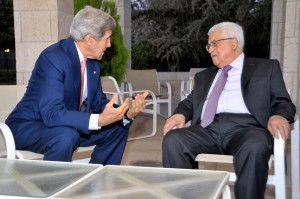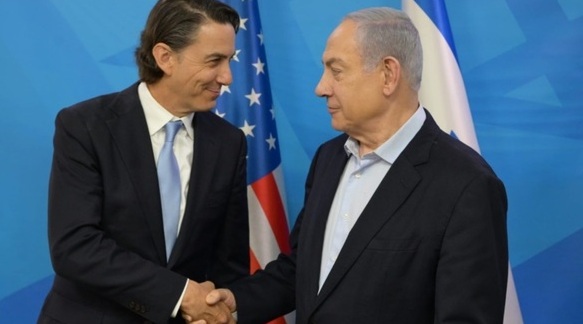A major semi-official Saudi newspaper has been making pro-Israel noises, indicating a Saudi desire for greater – if silent – ties with Israel. Will anyone in Israel listen?
The leading Saudi paper al-Sharq al-Awsat recently featured articles discussing recognition of Israel as a Jewish State, harsh criticism of the Palestinian authority and even the Jewish Biblical rights to the Land of Israel · Surprising as this sounds, such an editorial line fits the regional situation: Saudi Arabia and Israel have many common interests, and pragmatic cooperation between the two is natural · The offer has been made. Will there be any takers?

It’s a known fact that there is no free Arab press – only official or semi-official government newspapers. Of these, the London-based and Saudi-owned al-Sharq al-Awsat is known as a paper expressing the Saudi royal house’s political line. There’s been an interesting trend in the past few weeks in the pages of this important Arab daily: a series of articles with surprising attitudes towards Israel and the Arab-Israeli conflict. The articles discuss various aspects of the conflict, but they share a common approach. Even if the articles were not come directly by the Saudi royal house, they were nevertheless published with their consent and do not contradict their political attitude.
Recognizing Israel as a Jewish State – Why not?
Bakir Oweida is a Palestinian publicist based in London. Oweida writes regularly for al-Sharq al-Awsat on a variety of issues. He has been consistently moderate on the Israeli-Palestinian conflict; his criticism of the Palestinian leadership is authentic and not just a Saudi diktat. For instance, on the anniversary of Arafat’s death he wrote an article against Abu-Ammar’s legacy.
Now, in a far-reaching article entitled “Palestinian Recognition of Israel’s ‘Jewishness’ – Why Not?”, Oweida calls for nothing less than recognition of Israel as a Jewish State:
Let us assume, for the sake of argument, that there is official Palestinian recognition of Israel as a Jewish State. Well, what will happen afterwards? What will happen the next day? Will an uproar break out in the Arab world, and after them the Muslim world? Or worse, will the ‘Mother of all wars’ break out and Planet Earth burn after atomic bombs are launched from the Dimona warehouses and the Pakistani safehouses?
The political uproar which will break out in the Arab world…if it breaks out, in response to official Palestinian recognition of one of the inventions of Israel’s extremist rulers, that is ‘Israel as a Jewish state’, will not go beyond verbal activity and demonstrations which will fill the streets, and throats going hoarse from shouting.
According to Oweida, recognizing Israel as a Jewish state would actually benefit the Palestinians in negotiations. According to him, from its founding until Benyamin Netanyahu (“the deceiver”), the State of Israel has relied on Palestinian rejectionism to “save it from embarrassment before the countries of the world.” Oweida argues that Israel has greatly benefited from Palestinian rejectionism and their fear of dealing with challenges.
He dismisses the argument that recognition of Israel as Jewish would “open the door to expulsion of Palestinians in Israel to Jordan,” and explains that he doesn’t understand why there is such a great fear of change:
After all, the PLO already recognized Israel in its pre-’67 borders. Therefore, if the Palestinian side agrees to the Israeli demand, thus showing the demanding side (Israel) in a negative light, such a decision would not change what is seen as Palestine, that is the territorial framework, in which all members of the monotheistic faiths will live peacefully.
Obviously, Oweida had to balance this with a proper dose of anti-Israel criticism in order to make his position digestible by an Arab audience. Nevertheless, the article expresses clear support for the idea of recognizing Israel as a Jewish state, regardless of the Palestinian motivations for doing so. This is also clear from Oweida’s despair of the Palestinian leadership, which according to him fears a non-existent Arab and Muslim backlash and “cannot deal with the deceitful Israeli leadership.”

Responsibility for the Present Impasse – Also Palestinian
If we’re already on the subject of criticism of the Palestinian leadership, we can’t help but mention the fierce critique of another al-Sharq al-Awsat writer, Huda al-Husseini. Al-Husseini, a professional journalist and commentator, specializes in Iranian and European affairs and also apparently has ties with Saudi intelligence.
In the opening of an article analyzing John Kerry’s involvement in negotiations, she wonders aloud why the world and the Palestinians are silent in light of the horrific hunger in the al-Yarmouk Palestinian refugee camp in Syria (“there has been no protest or demand to life the siege by the PA or Hamas”). Palestinian leaders, al-Husseini sarcastically notes, are dealing with bigger problems and believe the al-Yarmouk problem will be solved with the fulfillment of the Right of Return.
As for the negotiations themselves, al-Husseini notes the statements of Saeb Erekat in 2009, in which he admitted that Israel offered it 100% of the territories and that Israel’s position is constantly weakening. Who, then, is not interested in an agreement?, she wonders. After all, most Israelis are interested in the two-state solution.
Then she attacks the rejectionism of the Palestinian leadership, blaming it for the present impasse:
What is taking place in the region after the ‘Arab Spring’ refutes the argument that stability in the Middle East will come through a solution to the Palestinian problem. This problem does not have priority, and there are those who believe the Syrian situation is more serious and important than the Palestinians’ situation.
The Palestinians’ problem is their leaders, who are not prepared for any solution. Since the UN Partition Plan there was no Arab readiness to agree to requirements necessary to continue negotiations. During the Oslo Accords it seemed as though Arafat had agreed to some partition and a two-state solution, but he remained a revolutionary, which negatively affected state-building in the West Bank and Gaza…
And Israel? Al-Husseini notes that in complete contrast to the Arab position, the Zionist leadership even agreed to the Peel Commission’s plan. According to her, Ben-Gurion “refused to refuse the Peel Plan,” and additionally he and Haim Weitzman were not afraid of the narrower borders offered as part of the parameters for a Jewish enclave.
At the end of the article, al-Husseini quotes a senior Western official who also expressed his opinion on the Palestinian leadership:
The Palestinians need leaders who live their lives and tribulations and are interested to rescue it in some way. Now on the other hand we see one of their leaders who insists on playing chess every day at 4 PM.
The Lieberman Plan? It’s Worth a Look
So after recognition of a Jewish state and harsh criticism of the Palestinian leadership, we also have an interesting read from Abdul Rahman al-Rashed, a publicist and former editor-in-chief of al-Sharq al-Awsat. Al-Rashed, today the CEO of the al-Arabiya television channel, a competitor of the Qatari channel al-Jazeera, has adopted very moderate positions on the Israeli-Palestinian conflict and been a strident opponent of violence and Jihadism.

Lately it seems that he’s even adopted the Lieberman Plan for territorial exchanges:
Let’s set aside the conditions and refusals. The content is more important than the titles…the Palestinian State Solution which the American Secretary of State Kerry is trying to promote…will most likely fail. Nevertheless I think that is the shaping of the final solution, which will be realized in ten years, or more, when the time is right.
The idea is based on an exchange of both territories and residents. That is, what happens if the Palestinians can get rid of settlements and Jewish settlers in the occupied West Bank, and Israelis from towns and villages settled by Palestinians from ’48. Then two independent states will arise, with new borders, after exchanges of cities and dense villages on both sides.
It’s an idea, which if implemented justly, would be better than the buried Oslo project. But the devil is in the details, that is most of the ‘Palestinians of Israel’, do not live in areas close to the West Bank or Gaza, and therefore carrying out the idea of population exchange would lead to the uprooting of more than a million people from their homes and lands.
The idea of transferring “Palestinians who live in Israel” to a Palestinian state, according to al-Rashed, will benefit the Palestinian State when it is established, because they are “more educated.”
Al-Rashed does not hold out hope that this solution will be carried out anytime soon, both because of refusal on the Israeli side and the inability of the Palestinian side to garner public support for the move. Nevertheless, he argues, “for many years the State of Israel thought a Palestinian state was a futile idea, and that the international community is wasting its time – this because it has no intention to accept this idea.”
The ideal situation for Israel is establishing a limited Palestinian municipal government under Israeli control, a situation that exists today. For a long time they thought that a day will come, or a crisis will break out, which will drive millions of Palestinians out of the West Bank, that is to Jordan, which was thought for a long time to be an alternative state.
Fifty years passed on this failed idea of Israel. It looks like there is a paradigm change, even among extremist Jews, according to which they cannot get rid of three million Palestinians in the West Bank and Gaza, and in this manner the Palestinians will stay in place, and Israel will not be a Jewish state.
He concludes: “the hope for ruling all of Palestine without the Palestinians, for Jewish Israelis, is gone. It’s an unrealizable dream. This is the reason they’ve begun to think of other alternatives, that is separation of historic Palestine, and not just recognition of the West Bank and Gaza.”
The Secret of Support for Israel: the Bible
The last in this series of articles is that of Iraqi publicist Khalid Kishtainy, also a regular columnist at al-Sharq al-Awsat. Kishtainy is an Iraqi writer who specializes in humor and irony. He even wrote a book on the subject of political humor in Arab culture. This time he has set his sights on explaining to the paper’s readers the secret of Western support for Zionism and Israel.
In his article he explains how the Bible, or the “Old Testament”, became part of the heritage of Western Christianity. In these Scriptures are contained “the history of the Jews in Palestine and their ties to it. The stories of the prophets and their service are an important part of Western civilization and its literature, art and music.” This article stands out in its neutral if not positive attitude on the subject, in contrast to the rest of Arab media outlets which refer to Jewish history and the Bible as an “invention”.
As an example, Kishtainy brings Verdi’s opera, Nabucco, which was the inspiration for the Italian national movement. The plot of the opera revolves around the Jewish People in the Babylonian exile and their longings to return to the Promised Land. Thus did Verdi’s work become one of hundreds of masterpieces which paved the way for the Zionist movement.

A Strategic Alignment of Mutual Interests
As was already mentioned, there is no media outlet in the Arab world that does not serve some political master, and it is therefore no coincidence that no less than four columnists in a leading Arab paper were allowed to express such unconventional opinions. It’s hard to ignore the feeling one gets upon reading the articles: this is a clear Saudi signal to Israel and the West.
We can try and complete the puzzle by looking at Saudi interests in the region: the Saudis see Iran, especially that of Rouhani, as an existential threat, and it doesn’t matter if this is indeed the case. Saudi Arabia is also threatened by Iran in Syria and Lebanon, where the former is taking part in a proxy war against Hizballah and Bashar Assad – both proxies of Iran. There is nothing more insulting for the Saudis than to see Assad sitting next to Iranian Foreign Minister Zarif and declaring that (Saudi) Wahhabi Islam is a danger to humanity.
Another existential threat to the Saudis, which is discussed in another article, is the threat of political Islam advocated by groups like the Muslim brotherhood. This is why they contributed much, in more ways than one, to the downfall of the Morsi regime and the coming crowning of al-Sisi.
Any way you look at it, everything Saudi Arabian officials see as a threat are also a threat to Israel, and thus both sides’ interests are aligned. This alignment is particularly strong, precisely because there are a number of basic interests and not just the Iranian issue. This is a new situation and there is of course no guarantee that it will last for long, but meanwhile Saudi decision makers have decided to act based on immediate critical interests. This is not a surprise as Saudi Arabia is a master of realpolitik in the fullest sense of the term.
None of this means that the Wahhabi Kingdom is pro-Zionist: it is consistent and clear in its ultimate goal of survival first and foremost. But as such, the Saudi Kingdom is not, and has never been, a radical state. Indeed, we have before us a number of major publicists employed by the Saudis who are very far from radical and who express opinions supporting peace and not the standard anti-Israel vilification common to the Arab media.
Between the lines, the Saudis are sending a clear message of pragmatic conciliation. The appropriate authorities in Israel would do well to heed its call.
English translation by Avi Woolf.
To receive updates on new articles in English, join Mida on Facebook or Twitter or join our mailing list.





The Saudis are the most cynical people on the planet who will do and say anything to serve their own interests for the next 15 minutes.